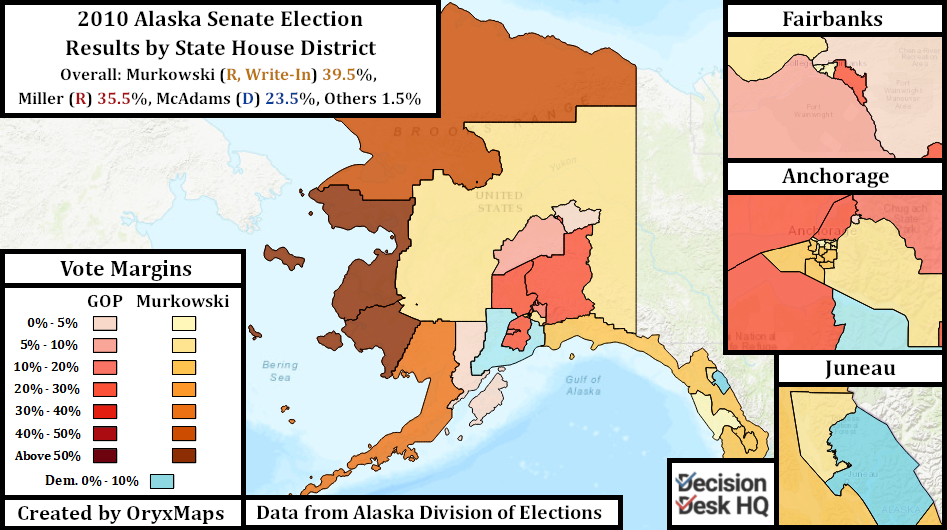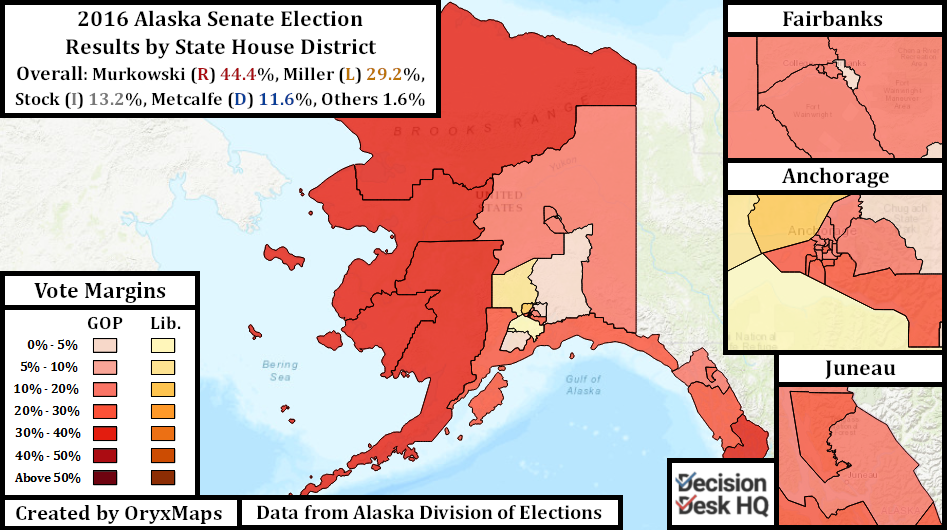Republican Senator Lisa Murkowski’s last binary Democrat versus Republican election was in 2004. The 2010 and 2016 Senate elections were multiparty affairs. Murkowski became the second ever senator to win a write-in reelection campaign after losing the GOP primary in 2010. She then defeated the same conservative challenger who ran as a Libertarian in the 2016 campaign.
The 2022 Senate election is guaranteed to continue Alaska’s trend of peculiarity. Alaska voters approved a Blanket Primary initiative in 2020, and now all potential candidates appear on the same primary ballot, with the top four candidates advancing to a ranked-choice general election. Murkowski faces a challenge from both the Republican base in the form of Kelly Tshibaka, and potentially from prominent Democrats or Independents. Murkowski will likely struggle to win reelection in 2022 because she is both disliked by the Alaskan electorate and abandoned by the Alaskan GOP.
An Abnormal Coalition
Senator Murkowski has held onto her seat without ever winning a majority of the vote. She won 48.6% in 2004, 39.5% in 2010, and 44.4% in 2016. She has never been accepted by the Republican electorate. Murkowski’s support for abortion access – among other divergences from mainstream Republican views – led to primary challenges even when she was an Alaska State legislator.

Murkowski compensated for her deficiencies with the Republican base by appealing to other groups within the Alaskan political arena. These include groups that align with the Democrats and those who oppose fierce partisanship of the major parties. For example, Murkowski has long worked to support, protect, and advance Alaska’s Native communities. Native American voters reciprocate her support at the ballot box. Alaska’s normally Democratic-voting Natives in the rural north, west, and central panhandle supported Murkowski in both 2010 and 2016 – despite Democratic candidates appearing on both ballots. Murkowski’s weakest areas have always been the Matanuska-Susitna Valley and Kenai Peninsula to the north and south of Anchorage. These two areas are traditionally the foundation of support for any successful Alaskan Republican.

Alaska’s new electoral system theoretically makes it easier to sustain the unusual coalitions similar to Murkowski’s but common in Alaska. For example, the GOP won a numerical majority in the Alaska State House, but the chamber is controlled by a coalition of Democrats, Independents, and specific Republicans. This coalition has maintained control since 2016. Republican-turned-Independent Bill Walker held the Governor’s office from 2014 to 2018.
The 2020 law sets up an initial “Blanket” or “Jungle” primary (similar to California, Washington, and Louisiana) where all candidates run on one ballot. Alaska’s system is however different from these states because the top four finishers, not the top two, advance to a ranked-choice general election. The elimination of party primaries in theory protects those that cross party lines from an angry base, and allows those candidates access to a wider, and theoretically more tolerant, overall electorate.
Anger from All Sides
Murkowski will likely be every Alaskan’s second-ranked choice. For Republican-aligned voters she is better than a Democrat, for Democrat-aligned voters she is better than a Republican, and for the committed Independents she does not align perfectly with either party and responds to the needs of her constituents. Murkowski’s problem is that there may not be enough voters who like her enough to rank her as their preferred candidate. Enough voters must rank Murkowski first for her to benefit from ranked-choice vote reallocation, and the Senator appears to lack this initial support.
A recent Change Research poll found that only 6% of Alaska Republicans, 48% of Democrats, and 32% of Independents approve of Senator Murkowski. More than half (59%) disapprove of Murkowski and just 26% approve of her tenure. Murkowski’s low approvals are not a recent development. A PPP poll from summer 2020 found numbers nearly identical to those from Change Research, just with a bit more Approving Republicans (17% vs 6%) and a bit less Approving Democrats (41% vs 48%). Large numbers of Democrat-leaning voters distrust her simply because of party affiliation. Murkowski is insufficiently conservative for Alaska’s Republicans, but votes the Republican line too often on important issues for Democrats to embrace the Senator. Cross-party cooperation insufficiently satisfies either partisan camp and leaves Murkowski vulnerable.
Murkowski’s decision to vote in favor of the second Trump’s second impeachment severed ties with the former President and loyal Trump voters. Her actions during the January impeachment led the Alaska Republican Party to censure Murkowski, further rupturing party support. Trump endorsed Kelly Tshibaka on June 18th and the Alaska Republican party followed suit with their own endorsement on July 10th. Tshibaka lacks a statewide profile – her only government experience is leading the Alaska Department of Administration. Her persona of a Trump-aligned “outsider” compensates for deficiencies of experience. Murkowski does still enjoy some of the benefits of incumbency, such as support from the senate leadership and their donor network.
The senator’s poor approvals do not translate into a winning coalition. Change Research tested a ranked-choice ballot featuring Murkowski, Tshibaka, Democrat-aligned Independent Al Gross, and a minor candidate from the American Independence Party. In that test Murkowski is in third place. A Cyginal poll from March found Murkowski in a similar predicament. She lacks the first-preference support needed and is instead eliminated and her supporters redistributed.
The Electoral Struggle
Murkowski is unpopular and unlikely to win reelection. Her situation is reminiscent of Arizona Senator Jeff Flake’s. Flake angered all sides of the electorate by publicly disagreeing with Trump but voting with the senate GOP majority, a situation that led to Flake’s retirement before the 2018 election. Murkowski is not fundraising as if she is in a competitive election. Like Flake, she too may be considering retirement rather than struggle for reelection.
The alternative Murkowski has is to not run as a Republican candidate. Murkowski said she does not want to be part of a Trump loyalist party in the aftermath of the January 6th riots, and when the state’s GOP subsequently censured her, the party stated that Murkowski should not run as a Republican in 2022. However, the Senator consistently says she is not a Democrat. Murkowski’s approval ratings suggest that the Republican label is hindering her reelection rather than helping. Aligning with the Independents and Democrats who approve of the Senator would improve her electoral prospects. After all, Murkowski has experience winning without the official Republican party label, and she still could repeat her 2010 upset.
Ben Lefkowitz (@OryxMaps) is a Contributor to Decision Desk HQ.